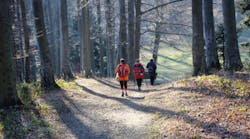For those who love to hike, camp, fish, bike or generally spend time outdoors, this story might fall into the “No Duh” news category. For others, though, it could be just what the doctor ordered.
A new study, published in a special issue of Ecopsychology, concludes that group nature walks are linked with significantly lower depression, less perceived stress and enhanced mental health and well-being.
People who recently had experienced stressful life events – such as a serious illness, death of a loved one, marital separation or unemployment – especially seemed to benefit from outdoor group walks.
“Walking is an inexpensive, low-risk and accessible form of exercise and it turns out that combined with nature and group settings, it may be a very powerful, under-utilized stress buster,” said senior author Sara Warber, M.D., associate professor of family medicine at the University of Michigan Medical School and member of the Institute for Healthcare Policy and Innovation. “Our findings suggest that something as simple as joining an outdoor walking group may not only improve someone’s daily positive emotions but may also contribute a non-pharmacological approach to serious conditions like depression.”
Our findings suggest that something as simple as joining an outdoor walking group may not only improve someone’s daily positive emotions but may also contribute a non-pharmacological approach to serious conditions like depression.— Sara Warber, M.D., associate professor of family medicine at the University of Michigan Medical School
Researchers from the University of Michigan, De Montfort University, the James Hutton Institute and Edge Hill University in the United Kingdom evaluated 1,991 participants from the Walking for Health program in England, which helps facilitate nearly 3,000 weekly walks and draws more than 70,000 regular walkers a year.
“Given the increase in mental ill health and physical inactivity in the developed world, we are constantly exploring new, accessible ways to help people improve their long term quality of life and well-being,” Warber says. “Group walks in local natural environments may make a potentially important contribution to public health and be beneficial in helping people cope with stress and experience improved emotions.”
Melissa Marselle, Ph.D., of the Department of Psychology at Edge Hill University was the lead author of the study. Warber’s long-time collaborator, Katherine Irvine, Ph.D., senior researcher of the Social, Economic and Geographical Sciences Research Group at the James Hutton Institute, also contributed to the study.
